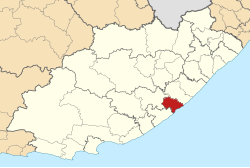Great Kei Local Municipality
| Great Kei | ||
|---|---|---|
| Local municipality | ||
|
||
 Location in the Eastern Cape |
||
| Country | South Africa | |
| Province | Eastern Cape | |
| District | Amathole | |
| Seat | Komga | |
| Wards | 7 | |
| Government | ||
| • Type | Municipal council | |
| • Mayor | Pat Hlungwani | |
| Area | ||
| • Total | 1,736 km2 (670 sq mi) | |
| Population (2011) | ||
| • Total | 38,991 | |
| • Density | 22/km2 (58/sq mi) | |
| Racial makeup (2011) | ||
| • Black African | 91.3% | |
| • Coloured | 1.3% | |
| • Indian/Asian | 0.1% | |
| • White | 7.1% | |
| First languages (2011) | ||
| • Xhosa | 88.8% | |
| • English | 7.0% | |
| • Afrikaans | 2.7% | |
| • Other | 1.5% | |
| Time zone | SAST (UTC+2) | |
| Municipal code | EC123 | |
Great Kei Local Municipality is an administrative area in the Amatole District of the Eastern Cape in South Africa. The name "Kei" is of Khoi origin, meaning "sand". The municipality is named after the Great Kei River.
The 2001 census divided the municipality into the following main places:
The municipal council consists of thirteen members elected by mixed-member proportional representation. Seven councillors are elected by first-past-the-post voting in seven wards, while the remaining six are chosen from party lists so that the total number of party representatives is proportional to the number of votes received. In the election of 3 August 2016 the African National Congress (ANC) won a majority of nine seats on the council. The following table shows the results of the election.
Coordinates: 32°35′30″S 27°53′02″E / 32.59167°S 27.88389°E
...
Wikipedia

